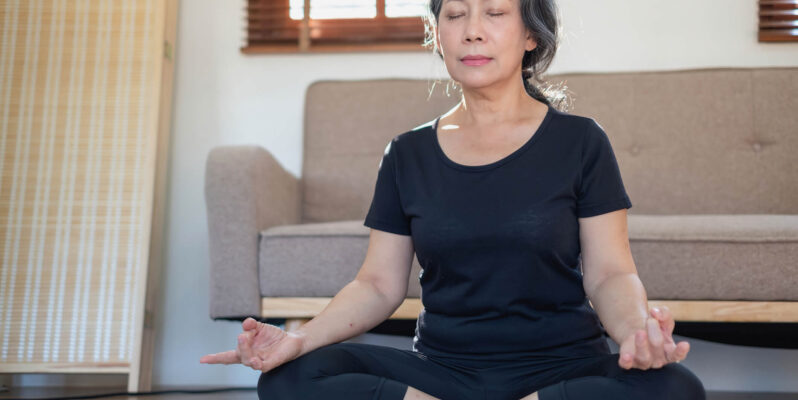
Historians believe people have been using meditation to calm their minds as far back as 3,000 BC. Yet research on the health benefits of meditation—how it can relieve anxiety, pain, and depression—has only been done recently. Perhaps most exciting is the conclusion that meditation can be just as effective, and perhaps even more so, than taking an antidepressant or other prescribed drug and without the unwanted side effects.
Meditation: a growing list of benefits for seniors
Meditation is all about awareness: focusing where your mind is now, noticing when it wanders and knowing how to bring your thoughts back to the present. It’s a good way to help train your mind to handle a “senior moment” when your mind wanders a bit during a conversation, but you’ve “trained” it to refocus quickly.
This same refocusing can be beneficial in avoiding injuries. For example, by enhancing your awareness, you might be less likely to trip over something and fall because you weren’t paying attention. Moving meditations such as Tai Chi and yoga also can help increase flexibility and movement for someone with limited mobility.
How meditation helps relieve anxiety and depression
Meditating can help you clear your mind of worry and stress as you learn how to not fixate on problems but seek a new perspective. This helps you open your thoughts to creativity and imagination as you come up with new solutions for an old problem. “Letting go” through meditation also can build your confidence and help you have more patience with yourself and with others.
In addition, research that meditations might help people manage the following:
- Anxiety
- Asthma
- Cancer
- Chronic pain
- Depression
- Heart disease
- High blood pressure
- Irritable bowel syndrome
- Sleep problems
- Tension headaches
According to Orlando Health, it comes down to reducing stress. When stress goes unchecked, your body is in overdrive, with an increased heart rate, increased blood pressure and higher rates of adrenaline and cortisol. If you don’t take steps to help your body recover, these stress hormones can build up and cause adverse health effects. Meditation can help activate the body’s relaxation response, resulting in a decreased heart rate and lower blood pressure. Adrenaline and cortisol levels also drop.
Download our free guide, Just The Facts: Your Guide to Independent Living.
What types of meditation are there?
You can sit. You can walk. You can engage in gentle movements that release tension and build flexibility and balance.
According to Harvard Health, meditation comes in many forms:
- Concentration meditation teaches you how to focus your mind. It’s the foundation for other forms of meditation.
- Heart-centered meditation involves quieting the mind and bringing the awareness to the heart, an energy center in the middle of the chest.
- Mindfulness meditation encourages you to focus objectively on negative thoughts as they move through your mind, so you can achieve a state of calm.
- Tai Chi and qigong are moving forms of meditation that combine physical exercise with breathing and focus. Tai Chi is often described as “meditation in motion.” Qigong is part of traditional Chinese medicine, incorporating relaxing, breathing, moving slowly, and meditating to restore and maintain balance.
- Transcendental meditation is a well-known technique in which you repeat a mantra—a word, phrase, or sound—to quiet your thoughts and achieve greater awareness.
How to meditate:
Remember to just relax and let things flow, and don’t pressure yourself. Here’s a few suggestions on how to get started:
- Find a comfortable and peaceful setting; whether indoors or outside.
- Sit in a chair or on the floor/ground with your back straight. (You do not have to cross your legs.)
- Breathe slowly and deeply. Try to relax away any tension you might feel.
- Close your eyes or find something specific to focus your gaze upon.
- Keep your mind focused inward. If your mind wanders, gently bring it back. Focusing on your breathing can be very helpful.
- Be gentle with yourself. Some days will be better than others.
Staying healthy, happy and living longer—that’s our goal at St. Mark Village
Our overall mission is to enrich the lives of the residents we serve by creating an environment that fulfills their every need—body, mind and spirit. Our Wellness Matters programs is just one example: we invite you to see all the ways that senior living at St. Mark Village can enhance your quality of life!
Come relax with us! Download our free guide, Just The Facts: Your Guide to Independent Living. Or contact us. We’d love to hear from you.


